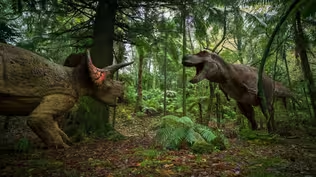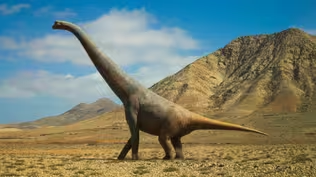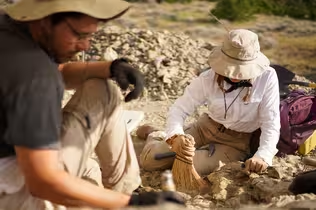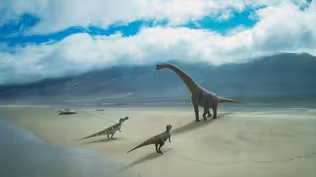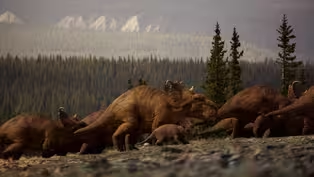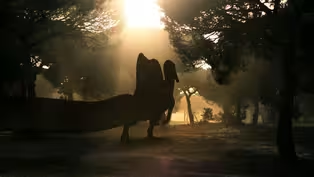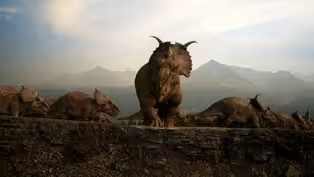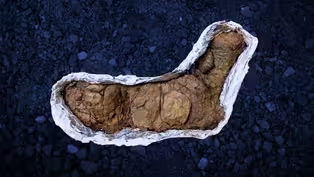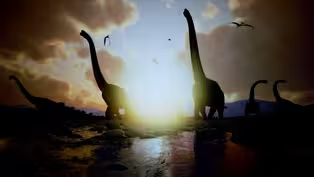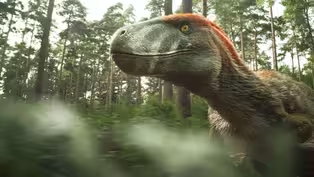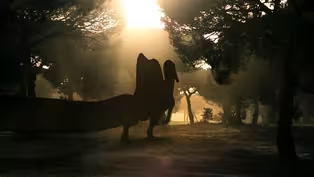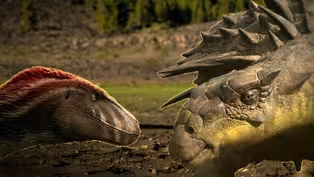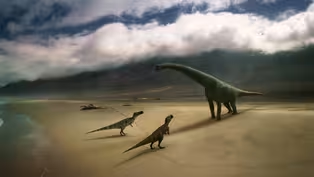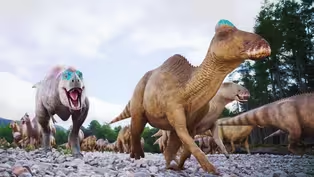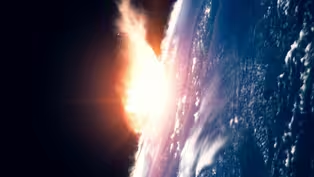
How Extreme Weather Is Revealing — And Destroying — Dinosaur Fossils
Special | 5m 59sVideo has Closed Captions
Imagine finding a rare fossil that you’ve been desperate to find - only for it to be put at risk.
Storms putting rare fossils in jeopardy is the dilemma facing this team in Alberta, Canada, who have just uncovered a juvenile tyrannosaur known as Albertosaurus. These dinosaurs have helped shape our understanding of how prehistoric predators were able to hunt in groups, and each new fossil provides tantalizing new clues. Palaeontologists will have to act fast to preserve their fragile specimen.
Problems playing video? | Closed Captioning Feedback
Problems playing video? | Closed Captioning Feedback
Narrator: Shane C. Campbell-Staton With Thanks: University of Alberta Laboratory for Vertebrate Paleontology, Royal Tyrrell Museum of Paleontology, Dig staff and volunteers Digital Producer & Director: Mark Atwill Digital Producer:...

How Extreme Weather Is Revealing — And Destroying — Dinosaur Fossils
Special | 5m 59sVideo has Closed Captions
Storms putting rare fossils in jeopardy is the dilemma facing this team in Alberta, Canada, who have just uncovered a juvenile tyrannosaur known as Albertosaurus. These dinosaurs have helped shape our understanding of how prehistoric predators were able to hunt in groups, and each new fossil provides tantalizing new clues. Palaeontologists will have to act fast to preserve their fragile specimen.
Problems playing video? | Closed Captioning Feedback
How to Watch Walking with Dinosaurs
Walking with Dinosaurs is available to stream on pbs.org and the free PBS App, available on iPhone, Apple TV, Android TV, Android smartphones, Amazon Fire TV, Amazon Fire Tablet, Roku, Samsung Smart TV, and Vizio.
Providing Support for PBS.org
Learn Moreabout PBS online sponsorshipMore from This Collection
Check out our 12 digital exclusives from our series Walking with Dinosaurs with BBC.
When Dinosaurs Ruled the Arctic Circle
Video has Closed Captions
Very few dinosaurs made it as far North as the Arctic Circle...except for two. (5m 52s)
We Were Wrong About Spinosaurus
Video has Closed Captions
Millions of years ago, dinosaurs ruled the Earth. But underwater it was a totally different world. (6m 36s)
Were Dinosaur Brains Designed For Combat?
Video has Closed Captions
Did Pachyrhinosaurus bones always gather in such great numbers? (5m 42s)
How We Solve Jurassic Mysteries from One Bizarre Fossil
Video has Closed Captions
Would you lick a 65-million-year old dinosaur poop? (5m 19s)
How Walking with Dinosaurs Created the Most Accurate Dinos Ever
Video has Closed Captions
Join the team behind the scenes! (6m 32s)
How to Find a Dinosaur that Hollywood Dreamed Up
Video has Closed Captions
What would make a Utahraptor so much larger than other raptor species? (5m 50s)
How the Walking with Dinosaurs Team Brought a Dinosaur Back to Life
Video has Closed Captions
The Walking With Dinosaurs team reveal how they created the Spinosaurus. (5m 50s)
How an Evolutionary Arms Race Created Bizarre Dino Designs
Video has Closed Captions
It’s grudge match time. Except that this one took place over millions of years. (5m 32s)
The Dinosaurs that Could Cross the Atlantic
Video has Closed Captions
How did dinosaur fossils get there? (5m 42s)
Did Dinosaurs Abandon Their Young to Help Them Survive?
Video has Closed Captions
In late Cretaceous Alberta, many apex predators roamed free, so how did the prey survive? (5m 45s)
Did a Meteor Kill All the Dinosaurs?
Video has Closed Captions
Did the asteroid kill the T. rex and Triceratops? (5m 42s)
Providing Support for PBS.org
Learn Moreabout PBS online sponsorship[thunderous explosion] -[Narrator] Sixty-six million years ago, the ferocity of Mother Nature brought an end to the reign of dinosaurs.
But these days, it's helping to reveal them.
Today palaeontologists Henry Sharpe and Mark Powers are on the hunt for the largest group of Tyrannosaurs ever discovered, Albertosaurus.
-[Mark Powers] We are boots on the ground looking for possible finds and usually what we're finding is just something slightly poking out of the hill.
-[Henry Sharpe] Everything can be found here.
You just got to spend enough time looking.
[mysterious music] -[Narrator] The art of dino prospecting has changed little in more than a century.
Time, patience, determination, and some luck.
Over time, nature's elements have combined to help erode the rock and expose these buried dinosaurs once more.
And it was while simply patrolling these hills that Mark and Henry made a spectacular discovery.
-[Henry] It was at the end of the day, we're tired, we hadn't found anything.
-[Mark] But to motivate ourselves, we kind of just kept saying, "One more sandstone, one more sandstone."
-[Henry] Eventually we got to one layer where we spotted some bones kind of eroding out of the hillside.
And as Mark was kind of standing up to look and see how far it went in either direction, I happened to look down at his boots and he's standing on what ended up being Rose's femur.
-[Narrator] They had stumbled upon the leg bone of an Albertosaurus, but they soon realize there was much more here.
Lying just below the surface was the remarkably complete skeleton of a teenage Tyrannosaur they named... Rose.
-We found the tibia was still connected to it.
And then as we explored that, we found that the foot was still there.
So everything was just together and just more and more bones were popping up.
-[Narrator] Including a piece of her skull, which could help give greater insights into how these predators hunted.
[Tyrannosaurs booming] Albertosaurus were ferocious carnivores and, terrifyingly, appear to have hunted in groups.
[growling, huffing] It's thought that the faster juveniles like Rose would have used their speed to flush out prey, driving them into the stronger jaws of the waiting adults.
-[Henry] Really nice fossils, especially of a tyrannosaur like Albertosaurus.
They're super, super rare.
When you get to find those, [contented sigh] it's the greatest feeling in the world.
[tapping with hammer] -[Narrator] But that feeling can be fleeting.
Because the weather that helped reveal Rose is now her biggest threat.
Exposed to the elements for the first time in over 70 million years, these fossilised bones are prone to erosion and degradation; needing to be protected at all costs or being lost forever.
But before the team can safely remove Rose's skeleton, the weather takes an alarming turn.
[wind howling] With escalating winds and a lingering tornado warning, the team is forced to abandon Rose.
-[Woman] Everybody, hold onto your hat.
-[Narrator] They do their best to protect their fragile discovery.
-[Woman] Get the rest of the quarry covered and everything.
[plastic rustling] -[Man] No, I don't think it can hold it.
-[Woman] Put a rock on top, and rocks around.
-[Henry] Yeah.
-[Man] Okay.
Let’s get the heffle outta here.
-[Henry] If we found a bit of the skull, it’s means Rose is going to [indistinct] -[Man] Screaming at us.
-[Narrator] They retreat down to basecamp.
[wind howling] -Winds up to 90 kilometres an hour are strong enough to pull shingles off of roofs.
I mostly think it's just safer to vacate.
-Yeah.
-We've never had anything like this in all the years we've been doing this, and now it's all happening all at once.
-And if all this is for a tyrannosaur with no skull, I don't know what I'm going to do.
Smile through the tears.
Yeah.
-[Woman] We should vacate sooner than later.
-[Man] Fun.
-Fun.
Field work is so much fun.
Why do we do this?
-[Narrator] The team shelters for the night.
But as for Rose up on the mountain, all they can do now is hope for the best.
The next morning, the skies have cleared.
[indistinct chatter] But has the vital fossil evidence survived the night?
-[Woman] All right, let's see if it lived.
This looks like it could have filled up with the water.
-[Henry] Okay.
-[Woman] Yay!
-[Narrator] The team can now set to work, trying to extract this precious skull fragment.
But with last night's chaos fresh in their mind, they know they have to act fast.
The weather can be a fickle friend to palaeontologists.
Without it eroding away the rock and earth beneath our feet, the stories of dinosaurs could remain untold forever.
But the joy of discovering a dinosaur skeleton offers no guarantee that it will survive a second extinction at the hands of the very same elements that helped uncover it.

- Science and Nature

Explore scientific discoveries on television's most acclaimed science documentary series.

- Science and Nature

Capturing the splendor of the natural world, from the African plains to the Antarctic ice.












Support for PBS provided by:
Narrator: Shane C. Campbell-Staton With Thanks: University of Alberta Laboratory for Vertebrate Paleontology, Royal Tyrrell Museum of Paleontology, Dig staff and volunteers Digital Producer & Director: Mark Atwill Digital Producer:...
